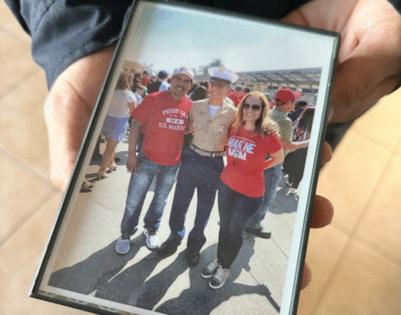Father of US Marine reservist deported following visit to Camp Pendleton base in Southern California
Published in News & Features
SAN DIEGO — The parents of a 24-year-old U.S. Marine reservist were detained by U.S. Immigration and Customs Enforcement upon visiting family at Camp Pendleton last month. The father was deported to Mexico, while the mother remains in detention, their son said.
Steve Ríos, who serves in the Marine Corps Reserves as a sergeant and is stationed in Long Beach, said that his parents, Esteban Ríos and Luisa Rodríguez, were detained when they were on their way to visit his pregnant sister and her husband, who is also a U.S. Marine living at the military base. The case was first reported by NBC 7 San Diego.
Ríos said that they showed their California driver’s licenses at the gate, which their parents had obtained when they received work permits, as they had done on previous occasions. Shortly after, they were asked to pull over and were later detained by ICE agents.
Last week, he was informed that his father had been sent back to Mexico.
“My heart just dropped,” Ríos said about the moment he got the call. “It’s the worst option that could have happened.”
Camp Pendleton announced in May an “interagency security initiative” in coordination with ICE, U.S. Customs and Border Protection, and the Naval Criminal Investigative Service. The operation was designed to “deter unauthorized installation access by foreign nationals and reinforce layered base defense strategies in alignment with national security objectives,” officials said in a news release.
As part of the initiative, announced as a pilot program, ICE agents were sent to assist with identity verification and screening operations at certain points of entry, officials said.
A spokesperson for Camp Pendleton referred questions about the parents’ arrests to ICE.
On Wednesday, an ICE spokesperson said the agency could not release any information about the cases. On Thursday, the Department of Homeland Security said in a post on X that Esteban Ríos had been charged with domestic violence and aggravated assault with a deadly weapon in 2020. The federal agency also said he was ordered removed from the U.S. in 2005.
Esteban Ríos, 56, acknowledged previous deportations in an interview in Tijuana, Mexico, on Thursday, saying he returned to the U.S. to be with his family. He said he was accused of domestic violence around 1994, but the charges were eventually dropped.
Ríos denied any charges related to aggravated assault with a deadly weapon, claiming he had been mistaken for someone else in the past and that the assault charge was likely a similar mistake. A search of San Diego Superior Court records Thursday under the name of Esteban Ríos showed no criminal charges.
Following their detention at Camp Pendleton, the couple, who lived in Oceanside, was transferred to the ICE office in downtown San Diego. There, they were put on ankle monitors and told to return for a check-in appointment at a later date as part of their case. Last week, they went to the office as required, with their son.
In the office hallway, there were volunteers who had been accompanying immigrants to their check-in and court appointments for months. While waiting for their parents to be called and talking with the volunteers, Ríos realized what was happening around him.
“Everyone who came in didn’t come out,” he noted. “Including my parents.”
Volunteers said they have noticed an increase recently in the number of immigrants being detained when they come in for their ICE check-in appointments. But it’s unclear if this is part of a new directive from the federal agency. ICE did not immediately respond to an inquiry about the matter.
Ríos said he joined the Marines, in part, to help his parents, who have lived in San Diego County for more than 30 years. They were both issued work permits last year as they had pending U non-immigrant status cases, also known as U visas, which are granted to victims of certain crimes.
“We’ve always had the worry that something might happen,” Ríos said. “I always wanted to help my parents out, so I decided to join the Marine Corps in hopes that it would help them out.”
For several years, there have been efforts to try to allow immediate family members of active-duty military to stay, at least temporarily, in the U.S. through a process known as “parole in place.”
Esteban Ríos is currently staying with a family member in Tijuana. He said that he is still processing what happened.
“I’m sad about what my wife and I are going through,” he said in Spanish during an interview Thursday in Tijuana.
Karla Kraus, immigration attorney representing Rodríguez, said what’s known as a bona fide determination was issued last year in her client’s case. This allowed Rodríguez to receive deferred action and a work permit while her case is pending, she said.
Ríos, who cleaned cars for a living, said he is “hoping for a miracle” so he can return to the U.S. legally someday. For now, he mostly wishes that his wife would be able to stay in San Diego with their family.
“Her children are asking God to give her the opportunity to stay,” he said, “especially since she’s going to be a grandmother for the first time.”
_____
(San Diego Union-Tribune staff writer Teri Figueroa contributed to this report.)
_____
©2025 The San Diego Union-Tribune. Visit sandiegouniontribune.com. Distributed by Tribune Content Agency, LLC.







Comments